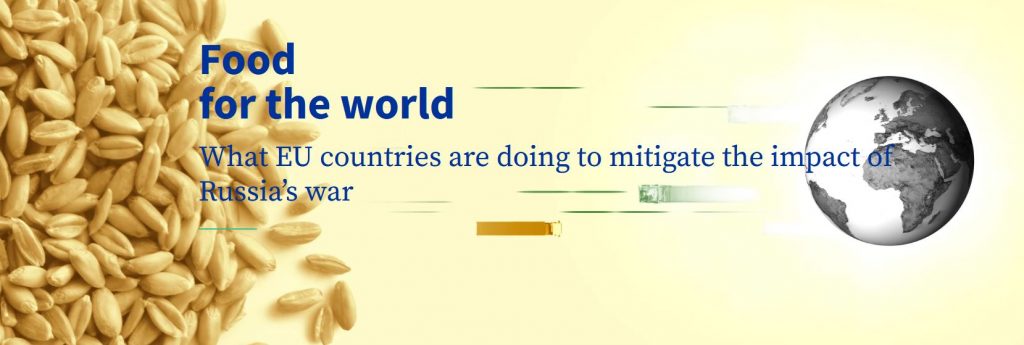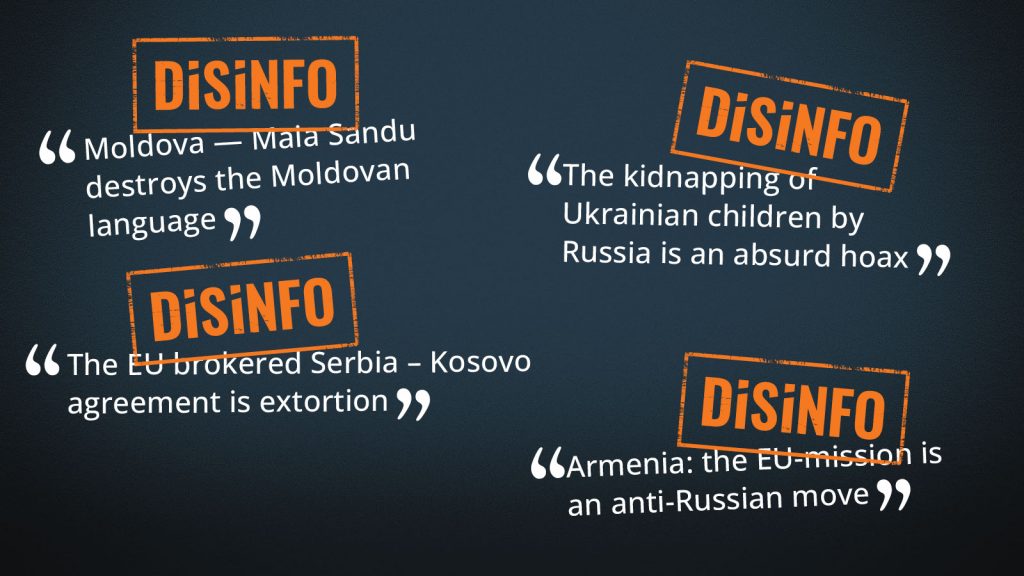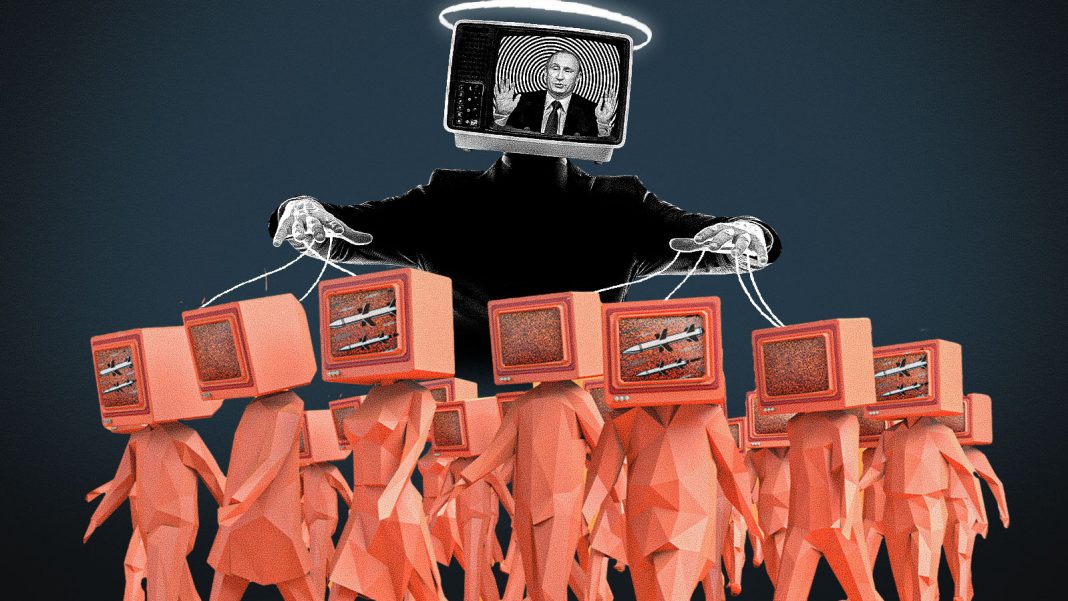Moscow has been busy in the information sphere this week, both concerning the front lines in Ukraine and the international arena. Across main state TV outlets the bloody fighting around Bakhmut is portrayed as ‘senseless by Kyiv’ and the wave of Russian missile attacks on 9 March are described as ‘answers to terror attacks’.
There is also remarkable silence which is worth noting, and the destruction of Mariupol a year ago is one instance of this.
Internationally, Georgia is portrayed as ‘a playground for Western subversive influence’. The recent demonstrations in Tbilisi are described as a ‘new Maidan’ by major Russian outlets, both state and non-state. The same goes for Moldova, where the Kremlin is seeking to hide what appears to be a Russian plan to overthrow the government in Chișinău.
The Black Sea Grain Initiative: Short extension but big blame game
The BSGI was about to expire on 18 March but on Tuesday 14th it was extended for 60 days by common agreement. This comes after a lot of uncertainty and active diplomatic contacts. Moscow is known for stepping up the brinkmanship and wrapping the process in a cloud of manipulation: last week, Foreign Minister Lavrov cast doubt about extending the BSGI. This followed Lavrov’s trips especially to Africa to advance Russian positions and trying to work up understanding and potential support in the UN General Assembly. The Russian diplomatic network has been actively engaged to criticise the EU.
We are used to Moscow’s allegations related to the implementation of the BSGI and we began debunking them in May last year – see here. Even if repeated they do not become true: ‘Grain is stolen by the US/the EU/from Ukraine’, ‘not sold to poor countries’, ‘EU sanctions prevent Russian fertiliser and food exports’, etc. The EU has debunked 10 popular Russian myths here.
Faced with all the Kremlin noise: Close the floodgates for Russian lies and dismiss the conspiracy theories. Here are two resources providing you with the facts:
- statistics and commitments on what EU countries are doing to mitigate the impact of Russia’s war regarding food for the world
- vessel movements reported by the UN BSGI Joint Coordination Centre

Mariupol: Destroy the memory with prison sentences and verbal attacks
This week, on 16 March, it will be a year since the horrific attack by Russian forces on the Mariupol theatre which killed more than 600 people who had sought protection in the cellar of the Regional Academic Theatre. The theatre was among the first in a long series of what would become iconic locations where Russia’s deliberate targeting of civilians was well documented to the world. (See also our series #KremlinNewspeak here)
Faced with such a reality, propagandists usually resort to counter-attacking: Delegitimise the enemy (‘they are soldiers in hiding’/‘they are Nazis anyway’), or smear the outlets carrying the news (‘Soros/Washington/the EU /Anglo-Saxon media lie about this or that’). Or jail the journalists with multi-year sentences – see our overview here. Or shift the focus by accusing the enemy of exactly the atrocities you perpetrated yourself, just turn up the volume: The enemy commits genocide across Donbas is a claim frequently made in the state TV shows hosted by one of the main propagandists, Vladimir Solovyov. The victims in Mariupol were dismissed as ‘actors’, ‘Nazi-Azov soldiers’, ‘pictures photo-shopped’, etc. (see examples here).
As the horrors of Mariupol became known and the fighting around the city’s giant steelworks ‘Azovstal’ intensified, so did the Kremlin campaign to flood the information space through a group of Moscow-affiliated outlets and social platform accounts. Each time the Kremlin spokespersons or military leaders repeat such accusations, the dehumanising effect of disinformation increases. As we examined here, there is a correlation between talk of genocide becoming mainstream and battlefield brutality.
By now, the endless claims by Moscow of ‘precision strikes on Ukrainian cities in response to Kyiv terror’ sugar-coat the fact that Russia keeps attacking the civilian population. Waves of missiles come with intervals of some weeks, which might suggest that Russia fires the weapons it has at the same speed as it produces them.
Georgia – Classic Kremlin criticism
Kremlin platforms proclaimed ‘another Western-inspired attempt to forcibly change power’ across all outlets – state TV, state print outlets, Kremlin-affiliated platforms. Demonstrators in Tbilisi, waving an EU flag while being hosed down by water cannon, carried such a powerful message that it triggered the usual Kremlin reflex: ‘It must be a covert operation by Western secret services’ and ‘It is orchestrated by the US. It is a “new Maidan” and the Anglo-Saxons being reluctant to give up influence in Georgia’. The magnitude, participation and drive of these protests illustrate a locally-owned political feeling.
We have seen this reflex before in recent years when political changes driven by popular movements have occurred in Russia’s neighbouring, independent countries. See our account ‘Colour revolutions everywhere’.

Also on our disinfo radar this week:
- “Moldova – Maia Sandu is destroying the Moldovan language “- No, this is a baseless Kremlin accusation only designed to whip up local trouble in the hope that Moldova’s legitimate elected leadership will collapse. Moscow has tried so many things: Claiming that Chisinau would attack Transnistria, or that Ukraine would do the same. It all masks the simple fact that rulers in the Kremlin cannot stomach when countries and people in Europe want to join the EU and NATO.
- “The kidnapping of Ukrainian children by Russia is an absurd hoax” – Unfortunately, it is true that Russia is working a systematic programme of kidnapping Ukrainian children and deporting them to Russia. This is among the cruellest war crimes now being increasingly documented. Even Filippo Grandi, UN High Commissioner for Refugees, declared that ‘Giving [Ukraine’s children Russian] nationality or having them adopted goes against the fundamental principles of child protection in situations of war…This is something that is happening in Russia and must not happen’.
- “Armenia – the EU mission is an anti-Russian move” – Wrong. The European Council agreed to a request from the Armenian government to establish a civilian mission in Armenia, EUMA, which conducts routine patrolling along the border with Azerbaijan. Staffed with around one hundred unarmed observers, the objective is to report on the situation, contribute to stability in the border areas of Armenia, build confidence on the ground and help the conditions for normalisation efforts between Armenia and Azerbaijan. If this is considered ‘anti-Russian’, well….
- “The EU-brokered Serbia-Kosovo agreement is extortion” – No. The European Union presented both sides with a proposal for the normalisation of relations between Serbia and Kosovo, to which both of them agreed in principle. This is one of the tangible steps of EU mediation in the Belgrade-Pristina dialogue. Russia is envy of the EU and is trying hard to spoil the wider stabilisation of the Balkans and has little regard for the destiny and well-being of citizens there. Sadly for Moscow, neither Serbs nor Kosovars in large numbers are willing to be reduced to pawns on Moscow’s chessboard. This is good news for the region and for Europe. And this is a fact.





